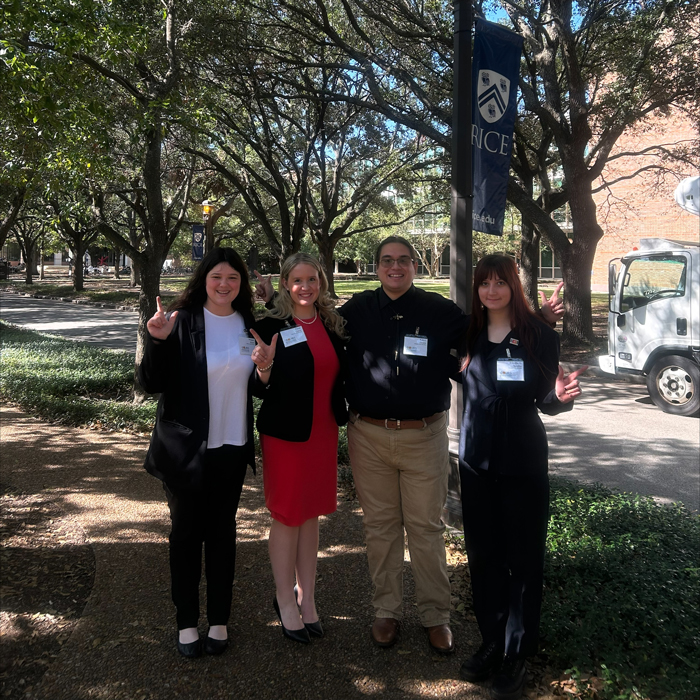
Four CAS student researchers present at Gulf Coast Undergraduate Research Symposium
Friday, December 13, 2024
Media Contact: Elizabeth Gosney | CAS Marketing and Communications Manager | 405-744-7497 | egosney@okstate.edu
Four students conducting research within Oklahoma State University’s College of Arts and Sciences delivered oral presentations at the Gulf Coast Undergraduate Research Symposium in Houston in November.
CAS students Elyse Cronic, Megan Roach, Kalen Strunk and Ferguson College of Agriculture student Elizabeth Struble attended GCURS, a prestigious undergraduate research conference that provides students around the world with opportunities to present their original research to a peer audience.
Elyse Cronic
A double major in chemistry and microbiology/cell and molecular biology on the pre-medical track, Cronic has conducted cross-departmental research with the Department of Microbiology and Molecular Genetics. There she investigates the effects of EIPE-1, a eumelanin-inspired compound developed by OSU’s Department of Chemistry.
Cronic examined how chemical compounds impact fungal cells, thereby bridging microbiology and chemistry with clinical applications.
“This journey has reinforced my passion for science and my commitment to making a difference in the field of medicine,” Cronic said. “I believe that research opportunities empower students to innovate and make meaningful contributions early on in their careers, fostering a culture of curiosity and impact at OSU.”
Megan Roach
Roach’s presentation was over research she started conducting in Dr. Karen Wozniak’s microbiology and molecular genetics lab: testing proteins that were isolated from lysosomes found in dendritic cells. Roach was able to find the protein NOSTRIN that possibly works to kill fungal cells by disrupting the cell wall or cell membrane and leading to osmotic lysis.
According to Roach, a biology pre-med major, having access to research labs creates a better educational environment for students, providing them with one-of-a-kind learning experiences.
“This is my third year in my lab, and I can look back on myself and see how much I’ve grown as a researcher and as a student,” Roach said. “This hands-on experience and undergraduate research benefits OSU students and can help cement a student’s passion for science.”
Elizabeth Struble
Struble’s presentation investigated the effect of an invasive species, Lespedeza cuneata (sericea), on arbuscular mycorrhizal fungi (AMF) in the Tallgrass Prairie, and how hyperspectral imagery predicts how fungi are altered.
As an environmental science and plant and soil science double major, Struble is conducting research under the mentorship of Department of Plant Biology, Ecology and Evolution faculty member Dr. Benedicte Bachelot. She hopes to expose more people to the research and hard work of students within CAS and Ag.
“I enjoyed presenting and networking with the other undergraduates about their research,” Struble said. “The symposium is a great place to put your foot into the door with oral presentations and receive constructive feedback from other students and faculty about your strengths and what you can improve.”
Kalen Strunk
Strunk’s presentation was on an Argentinian Apoid wasp's species checklist he created in collaboration with the American Museum of Natural History in New York City. His project was part of an REU — Research Experiences for Undergraduates program — through the National Science Foundation. Strunk discussed the importance of cataloging these species to better understand biodiversity and how this work can inform future ecological research.
As a microbiology student, Strunk discovered that his passion for science extends beyond microbiology into broader areas of biology, particularly biodiversity and ecology.
“One of the most enjoyable parts of science is sharing your work and advocating for its importance,” Strunk said. “I think students who have the time and resources to explore research opportunities like these have everything to gain. It’s a chance to discover new interests, build meaningful skills and contribute to the scientific community.”
Story By: Adeola Favour, CAS graduate assistant | fadeola@okstate.edu
